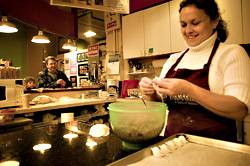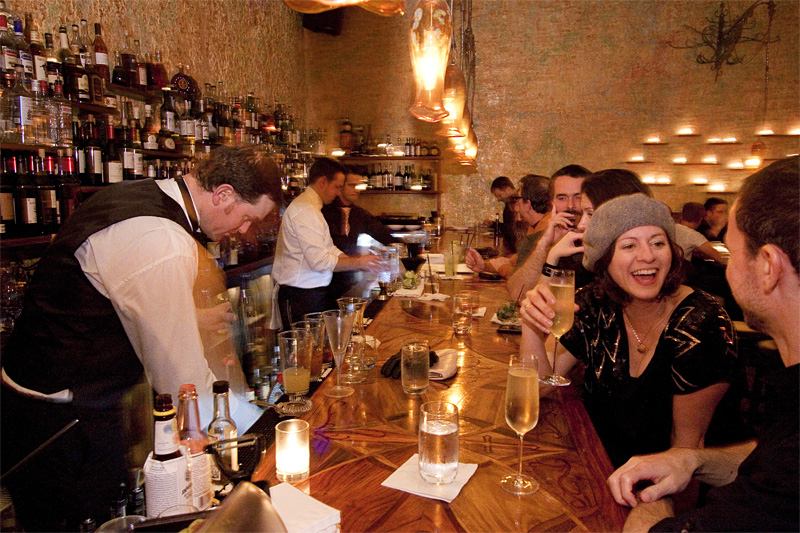Three scenes from the borscht belt:
I. We Serve Lunch
The front window at European Foods advertised lunch, but when I walked into the tiny deli, all I could see were shelves of Georgian wine and Russian-language videos. The refrigerated cases were stocked with imported sausages, cream-inflated cakes, and salads, all labeled in Cyrillic letters. But the dining room off to the side was dark, and no one appeared to be lining up for takeout. I asked the owner whether he did, in fact, serve lunch.
“Yes,” he said. He fell silent, and gave my co-worker and me the once-over.
“Could we get some sandwiches or something?” I prodded.
“That is American-style lunch,” he replied, making it sound like I’d asked for boiled grubs. “We serve traditional Russian lunch. Do you like pork stew? You’ll have some traditional Russian pork stew….” he continued on, leading Laura and me into the next room. He flipped on the light to reveal a few tables, several streamers hanging from the ceiling, a party room waiting for the party to start. As we passed through the door, we noticed a laminated menu taped up next to it, but our host was already plotting out our traditional Russian lunch, so we never got a chance to review it.
“You like borscht,” he continued. This was not a question. “Perhaps a salad?” I nodded. “We’ll start with a meat salad. Borscht and salad, two of each.” Lunch suddenly turned into a three-course meal.
In truth, I was in search of sit-down Russian restaurants, but was having a hard time finding any. Seattle and Bellevue’s famous restaurants (such as Kaleenka and Continental Restaurant) have closed, and the banquet halls that the Russian community still uses for weddings and parties don’t open to the public. What’s left appears to be a handful of piroshki bakeries, a crepe restaurant in Kent called Olga’s Russian Blinchiki, and more than a dozen Mitteleuropean delis like European Foods, which does a brisk business in imported goods and catering but struggles to build up a dine-in clientele.
As we sat, girding our loins for the feast, three more people peeked out from the kitchen to also give us the once-over. The youngest of them eventually turned out to be our waitress, who after a few minutes brought us each a banana-split dish with three round scoops of a bologna-potato-pea “Olivia” salad thickly enrobed in mayonnaise. Delicious. Then a plate of the pork, homey and tender, with browned potato coins and sprigs of parsley for garnish. As I finished my plate, she reappeared with two bowls of borscht. “I was hoping you’d forgotten,” I groaned. She tittered, unmerciful. I still managed to finish off most of the bowl of the cabbage-heavy, magenta soup, which shut down all rational thought for the rest of the afternoon.
II. To Russia With Love
I e-mailed Elena Dubinets, deputy executive editor of Seattle’s Russian World newspaper, to ask her about the dearth of Russian restaurants in a region with so many Russian speakers. “A major part of the Russian-speaking population here,” she wrote back, “is large, religious Ukranian families with limited income. They usually cook at home, and cook very well. Another major part is educated professionals, and they don’t go to Russian restaurants because of some cultural connotations such visits might involve (hard drinking, crazy dancing, etc.). They are usually fully immersed in American activities.”
Dubinets recommended that I go to her favorite Russian deli, From Russia With Love, a 13-year-old Bellevue establishment that recently expanded to the Crossroads mall. At least three times as big as the first deli, From Russia’s shelves are packed with jarred mushrooms, schools of tinned fish, and preserves made from fruits that may not even grow in North America. The freezer case contains bags of homemade pierogi to boil up at home. Dozens of bins in the Russian Pick-a-Mix row brim with glittery foil-wrapped chocolates. There is, of course, caviar.
Sergey Dunayev, the owner, maintained the deli’s old location for a year or so after the move and turned it into a cafe, but he said that running two businesses at once was too much for him and his wife. So at the bigger location, he’s limited service to takeout. FRWL serves pretty unremarkable sandwiches, but again, sandwiches aren’t its thing. Salads are: the sweet, purple shredded beets dressed in mayonnaise, the bright orange version with shredded carrots. FRWL’s potato salad, sans meat, didn’t impress as much as European Deli’s, but all the eggplant salads did, especially Armenian eggplant, fat, soft chunks of the vegetable marinated in vinegar, garlic, and herbs.
To find the deli’s cult item, walk over to the bread bin and pick up a crusty oval loaf of dark rye bread. Chances are good it will be warm. Dunayev says he imports the dough from Germany and bakes it up several times a day—up to five times on weekends. Pick up one, a pound of Danish butter, and a jar of pickled herring, and you’ve got yourself quite the feast.
III. Back to Ol’ Reliable
I chased down a few more leads in search of a full meal: a place in Edmonds that turned out to specialize in gyros, a new place several of the people I spoke to told me had taken over Kolbeh in SoDo, though the Persian restaurant-club still has its original sign. So I ended up where I always do when the need for beets strikes: Cafe Yarmarka in Pike Place Market.
Slava Baklanov and Rozalia Baklanova have owned the market stall for 12 years, which consists of two tables squinched up close to the counter, so that when I scored a counter stool at peak lunch time, I had to eat and hold my breath simultaneously to avoid rubbing my ass against the back of some tourist’s head.
Most locals pick up a baked piroshki or some beet salad from the display case and run off, but the baked goods get warmed up in the microwave, which would ruin the flakiest croissant. For me, the usual was a plate of cucumber-dill salad—sometimes I switch out the vinaigrette-dressed coleslaw or a bowl of bright-pink borscht—and a plate of potato-mushroom pierogi, which are plunged into boiling water, then tossed with a little melted butter and served with paper cups of sour cream and watery tomato sauce.
The reason I return to Yarmarka time and time again is that I love sitting at the counter, bathing in the steam of a dozen dumplings while I watch the cooks spend every spare moment folding up pelmeni, Russian tortelloni filled with ground chicken, pork, beef, or sometimes lamb. A pinch of meat here, a twist here, and another neat round joins its identical siblings on a baking sheet, to be frozen until the next lunch rush. My pierogi and cabbage are no zakuska table, that fabled Russian smorgasbord stocked with dozens of little plates and bottles of champagne and frozen vodka, but at least I can sit down to savor them.






